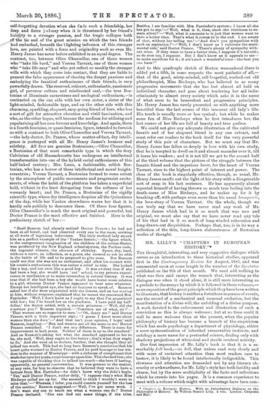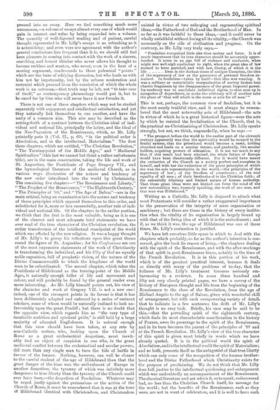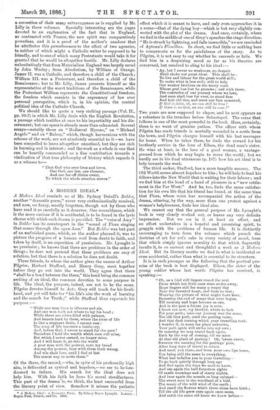MR. LILLY'S " CHAPTERS IN EUROPEAN HISTORY."*
THE thoughtful, interesting, and very suggestive dialogue which serves as an introduction to these historical studies, appeared first in the Contemporary Review for August, 1885, and was commented upon at some length in the number of the Spectator published on the 8th of that month. We need add nothing to what was then said except the remark that, interesting as the dialogue was when it stood alone, it is still more interesting as a prelude to the essays by which it is followed in these volumes,— as an exposition of the great principle which they have been written to illustrate, that history is neither a fortuitous sequence of events, nor the record of a mechanical and unmoral evolution, but the manifestation of a divine will, the unfolding of a divine purpose. A work devoted to the enforcement and illustration of such a conviction as this is always welcome ; but at no time could it well be more welcome than at the present, when the popular philosophy of history has become a branch of the empiricism which has made psychology a department of physiology, ethics a mere systematisation of inherited preservative instincts, and ontology a mere name for a pretended science, dealing only with shadowy projections of whimsical and sterile cerebral activity.
Our first impression of Mr. Lilly's book is that it is a re. markably fall book,—so full, that unless read very slowly and with more of sustained attention than most readers care to bestow, it is likely to be found intellectually indigestible. This slowness and attention are demanded not by any literary ob- scurity or awkwardness, for Mr. Lilly's style has both lucidity and charm, but by the mere multiplicity of the facts and reflections which he crowds into his pages. It is a common experience to meet with a volume which might with advantage have been com-
• Chapter. in European History'. With an Introductory Dialogue on the Philosophy of History. By William Samuel Lilly. 2 vols. London: Chapman and Hall. pressed into an essay. Here we find something much more uncommon,—a volume of essays almost every one of which would gain in interest and value by being expanded into a volume. The quantity of well-digested reading and of patient, careful thought represented in Mr. Lilly's essays is as refreshing as it is astonishing ; and even were our agreement with the author's general conclusions less frequent than it is, we should still feel keen pleasure in coming into contact with the work of a sincere, searching, and honest thinker who never allows his thought to become reckless and wanton, who never, even in the heat of a moving argument, condescends to those polemical " points " which are the bane of edifying discussion, but who leads us with him not by impetuosity, but by the urbane moderation and restraint which proceed from the conviction of which the whole work is an outcome,—that truth may be left, not " tb take care of itself," as contemporary phraseology would put it, but to be cared for by One who will never leave it nor forsake it.
There is not one of these chapters which may not be studied separately with enjoyment and intellectual satisfaction, and yet they naturally link themselves to one another, and have the unity of a common aim. This aim may be described as the setting-forth of a contrast between the Christian ideal of indi- vidual and national life, principally the latter, and the ideal of the Neo-Paganism of the Renaissance, which, as Mr. Lilly pointedly puts it (Vol. II., p. 69), " in the political order is Absolutism, and in the intellectual, Materialism." The first three chapters, which are entitled, "The Christian Revolution," " The Turning-point of the Middle Ages," and " Mediseval Spiritualism" (this last we cannot but think a rather unfortunate title), are in the main constructive, taking the life and work of St. Augustine, the Pontificate of Pope Gregory VII., and the hymnological literature of the mediaeval Church, as in various ways illustrative of the nature and tendency of the new order introduced into the world by Christianity. The remaining five chapters—" The Renaissance and Liberty," " The Prophet of the Renaissance," " The Eighteenth Century," "The Principles of '89," and " The Age of Balzac"—are in the main critical, being an examination into the nature and tendency of those principles which opposed themselves to this order, and substituted for it, more or less successfully, another rule of indi- vidual and national life. Of the chapters in the earlier portion, we think that the first is the most valuable, being as it is one of the clearest and most adequate brief statements we have ever read of the true character of the Christian revolution, the entire transference of the intellectual standpoint of the world which was effected by the new religion. It was a happy thought of Mr. Lilly's to group his reflections upon this great theme round the figure of St. Augustine ; for his Confessions are one of the most impressive statements of the work of Christianity in transforming the individual, and his City of God an equally noble exposition, full of prophetic vision, of the nature of the Divine Commonwealth to which the kingdoms of the world were to be subordinated. The second chapter, which takes the Pontificate of Hildebrand as the turning-point of the Middle Ages, is naturally enough fuller of life and movement and colour, and will probably be found by the general reader even more interesting. As Mr. Lilly himself points out, his view of the character and work of Gregory VII. is not a new one indeed, one of the strongest points in its favour is that it has been deliberately adopted and enforced by a series of eminent scholars, some of whom would be naturally inclined to look un- favourably upon the great Pontiff ; but there is no doubt that the opposite view, which regards him as " the very type of insatiable ambition and spiritual pride," is still held by a large majority of educated Englishmen. It is natural enough that this view should have been taken, at any rate by non-Catholic writers, who, looking upon the Church of Rome as a great ecclesiastical despotism, must inevit- ably find an object of suspicion in one who, in the great medireval conflict between the ecclesiastical and secular powers, did more than any single man to turn the tide of battle in favour of the former. Nothing, however, can well be clearer to the careful student of the age of Hildebrand than that the great danger of the time was the enthralment of Europe in another despotism, the tyranny of which was infinitely more dangerous to true liberty than the tyranny of the Church could ever have been,—the despotism of Feudalism. Whatever may be urged justly against the pretensions or the action of the Church of Rome, it must be remembered that it was at the time of Hildebrand identical with Christendom, and Christendom
existed in virtue of two enlarging and regenerating spiritual ideas,—the Fatherhood of GocLand the Brotherhood of Man. In so far as it was faithful to these ideas,—and it could never be wholly unfaithful without losing all its vitality,—the Church was
necessarily on the side of civilisation and progress. On the contrary, as Mr. Lilly very truly says,— "Feudalism recognised little else than matter and force. It is of much importance that its true character should be accurately appre- hended. It arose in an. age full of violence and confusion, when might was well-nigh equivalent to right, when the great idea of law seemed to have perished, and with law, liberty, of which it is the
life Even in the darkest times of antique Ca3sarism, the idea of the supremacy of law as the guarantee of personal freedom re- mained. In feudalism—taken by itself—that idea was wanting. It was a military or materialistic reorganisation of society broken into chaotic fragments by the disappearance of the great Imperial power. Its tendency was to annihilate individual rights, to shut men up in categories of dependence, to make the arbitrary will of another take the place of that will which is the norm or rule for all men.'"
This is not, perhaps, the common view of feudalism, but it is the most nearly truthful view, and it must always be remem- bered that the most noteworthy acts of Hildebrand—the acts in virtue of which he is a great historical figure—were the acts by which he resisted the feudalisation of the Church, that is, the practical un-Christianising of Christendom. Mr. Lilly speaks strongly, but not, we think, unguardedly, when he says :—
" The prospect before the world in the earlier part of the eleventh century apparently was that the spirituality would be merged in the feudal system, that the priesthood would become a caste, holding churches and lands on a secular tenure, and gradually, like seemlar holders, acquiring powers of alienation. It is not too much to say that, if this result had been attained, the whole future of Europe would have been disastrously different. For it would have meant the extinction of the Church as a society perfect and complete in herself, and with her the extinction of the great principles of which she was the sole representative in the world,—the principles of the supremacy of law ; of the freedom of conscience ; of the real equality of all men ; of their brotherhood in the Christian faith ; of the essentially fiduciary and limited nature of human authority. That these great ideas were not blotted out from the mind of the new nationalities wag, humanly speaking, the work of one man, and that man was Hildebrand."
Writing as a Catholic, Mr. Lilly is disposed to attach what most Protestants will consider a rather exaggerated importance to the preservation of the integrity of mere organisation or machinery ; but there are times in the history of every institu- tion when the vitality of its organisation is largely bound up with that of the living idea of which it is the embodiment ; and if, as we think it was, the age of Hildebrand was one of these times, Mr. Lilly's contention is justified.
We have left ourselves little space in which to deal with the chapters which probably, so far as the author's intention is con-
cerned, give the book its reason of being,—the chapters dealing with the spirit of the Renaissance, and with the after-workings
of that spirit in post-Renaissance times, notably in the time of the French Revolution. It is in this portion of his work,
which is of the greatest practical interest, because it deals so directly with many of the problems of to-day, that the fullness of Mr. Lilly's treatment becomes seriously em-
barrassing to a reviewer. In some three hundred and fifty not very closely printed pages, we have a survey of the history of European thought and life from the beginning of the Renaissance to the close of the Revolution, from the age of Michael Angelo to the age of Balzac, given with wonderful skill of arrangement, but with such overpowering variety of detail, that to indicate in a few sentences the drift of Mr. Lilly's thought is no easy task. Briefly, his case may be said to be
this,—that the pervading spirit of the eighteenth century, which finds its most characteristic manifestation in the history of France, owes its parentage to the spirit of the Renaissance, and in its turn becomes the parent of the principles of '89 and of the French Revolution. Mr. Lilly's view of the true character of this spirit is given most briefly in words which we have already quoted. It is in the political world the spirit of Absolutism, and in the intellectual world the spirit of Materialism; and as both, presents itself as the antagonist of that true liberty which can only come of the recognition of the human brother- hood and the Divine Fatherhood which Christianity exists for the purpose of proclaiming. We do not think that Mr. Lilly does full justice to the intellectual quickening and enlargement which was undoubtedly an accompaniment of the Renaissance. The classical literature and art which it, so to speak, rediscovered had, no less than the Christian Chureh itself, its message for the world ; but the benefits of the Renaissance, such as they were, are not in want of celebrators, and it is well to,have such
a correction of their many extravagances as is supplied by Mr. Lilly in these volumes. Specially interesting are the pages devoted to an explanation of the fact that in England, as contrasted with France, the new spirit was comparatively powerless, and it is a proof of the author's candour that he attributes this powerlessness to the effect of two agencies, to neither of which might a Catholic writer be supposed to be friendly, and to one of which many Protestants would take it for granted that he would be altogether hostile. Mr. Lilly declares unhesitatingly that from Materialism England was largely saved by John Wesley ; from Absolutism, by William of Orange. James II. was a Catholic, and therefore a child of the Church ; William III. was a Protestant, and therefore a child of the Renaissance; but to Mr. Lilly, James presents himself as the representative of the worst traditions of the Renaissance, while the Protestant William represents the Constitutional freedom, the freedom which consists in the supremacy of law over personal prerogative, which is, in his opinion, the central political idea of the Catholic Church.
We should like to quote a very striking passage (Vol. II., pp. 86-7) in which Mr. Lilly deals with the English Revolution, a passage which testifies at once to his impartiality and his dis- cernment; but our space is already more than exhausted. Several essays—notably those on " Mediaeval Hymns," on " Michael Angelo" and on " Balzac," which, though harmonious with the scheme of the work, are not absolutely essential to it—we have been compelled to leave altogether unnoticed, but they are rich in learning and in interest ; and the work as a whole is one that can be heartily commended as a fine contribution towards a vindication of that true philosophy of history which regards it as a witness to-
" That God who ever lives and loves, One God, one law, one element,
And one far-off divine event, To which the whole creation moves."




































 Previous page
Previous page